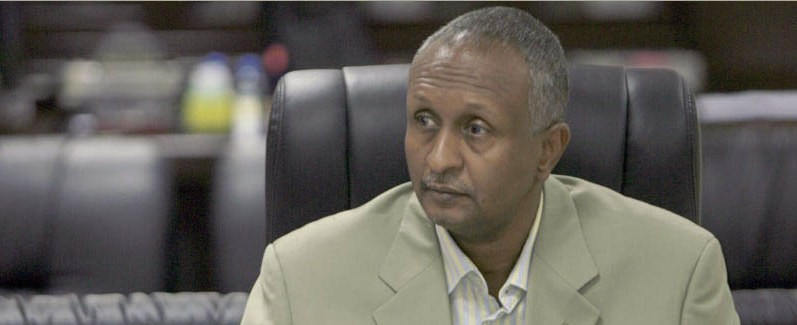The diplomatic agreement to allow aid access into Sudan’s war-torn border states has expired. The country’s top aid official told Radio Tamazuj that the government now has its own plan for the relief effort.
‘Tripartite’ diplomats Haile Menkerios, Mahmoud Kane and Salah Halima last February proposed that Sudan and the Sudan People’s Liberation Army-North (SPLM-N) agree to allow deliveries of food and aid services to South Kordofan and Blue Nile states in spite of ongoing hostilities. The diplomats represent the UN, African Union and Arab League, respectively.
Their proposal was accepted in part in early August when Sudan and the rebels signed separate memoranda with the Tripartite group. But the diplomats’ deal with the Sudanese government had a duration of only 90 days.
In an exclusive interview, the top Sudanese official for aid oversight pointed out that his government’s agreement with the Tripartite members ended on 3 November. Dr. Suleiman Abdul Rahman, General Commissioner of the Humanitarian Aid Commission (HAC), also repeatedly and vehemently denied the existence of humanitarian crises in the two states, saying that the situation is stable.
He acknowledged, however, that “humanitarian reinforcements” are needed to prevent such an event, announcing that the Sudanese government will provide this assistance to nearly 137,000 citizens, even in areas under rebel control. He described this effort as a new initiative, saying that the plan is ready to go, and will be carried out in collaboration with national and international partners.
Points of disagreement
Both belligerents have protested the way in which the UN tried to carry out the Tripartite agreement. A ‘plan of action’ drafted by the UN Coordination Agency (OCHA) was delivered to SPLM-N on 14 August. The movement objected to elements of the plan and did not warm to a revised version distributed on 29 September.
The rebels explained their concerns in a ‘briefing note’ from their relief agency, dated 24 October. Specifically, they said that the UN plan failed to involve them in mechanisms for overseeing and carrying out the aid work, including participation in a joint oversight committee. This committee had been part of the Tripartite diplomats’ original February proposal but was removed from the August memoranda.
OCHA planners had limited discretion to involve SPLM-N because the memorandum of understanding between Sudan and the Tripartite members stated that “the entire humanitarian operations shall be under GoS supervision,” and that the aid distributions should be done only by “implementing partners acceptable to the GoS.” Indeed, the memorandum made no reference at all to the rebel movement, suggesting that there was no mechanism for direct contact between the two sides during the planned relief operations.
SPLM-N was also concerned about “composition of the [humanitarian] assessment teams,” perhaps for military intelligence reasons, as well as lack of provision for a ceasefire. On the whole, however, they downplayed their technical objections saying, “It was not the technical content of the Plan of Action that was a matter of concern to the SPLM-N but the lack of progress, lack of goodwill and loss of credibility in the bilateral arrangements where the GoS fully controls the pace of implementation of the tripartite proposal for humanitarian access.”
The Sudanese government, for its part, likewise objected to some elements of the UN work plans. But according to Dr. Abdul Rahman, the main problem came from the rebels, who had trouble communicating with the Tripartite members and who refused to commit to certain conditions.
‘Access negotiations for 16 months’
According to the UN, the Tripartite initiative did not result in any actual relief efforts. In its weekly bulletin dated 28 October the agency UN-OCHA stated, “In SPLM-N controlled areas, no humanitarian staff have been able to enter from within Sudan and no food aid has been delivered, despite access negotiations that have been ongoing for more than 16 months.”
UN Secretary-General Ban Ki-moon continues to back the initiative. His spokesman Martin Nesirsky last week responded to public remarks by Dr. Abdul Rahman, telling reporters in New York that the Tripartite members “are concerned” by the commissioner’s position not to extend the aid deal.
The Tripartite members “have requested an extension of the Memorandum of Understanding,” according to Nesirsky.
Ban Ki-moon dispatched his envoy Haile Menkarios to discuss the issue with Interior Minister Ibrahim Mahmoud Hamid on Tuesday. After the meeting the minister made some general conciliatory statements to the state news agency, but did not make any specific or overt commitment to renew the Tripartite deal.
Commissioner Abdul Rahman explained that despite the end of the aid deal it had some positive results. He told Radio Tamazuj that the positive part about the Tripartite memo was that it boosted confidence between the Sudanese government and the international and regional institutions and confirmed the government’s seriousness and concern towards all the Sudanese citizens affected by armed conflicts in South Kordofan and Blue Nile.
Radio Tamazuj tried to reach Neroun Philip Ajo, the SPLM-N official who signed the August memorandum. He was unavailable for comment. But the rebel movement has previously questioned the credibility of the Tripartite process and would prefer to involve IGAD, a regional intergovernmental body that aligns more closely with SPLM-N because of the membership of Uganda and Kenya.




